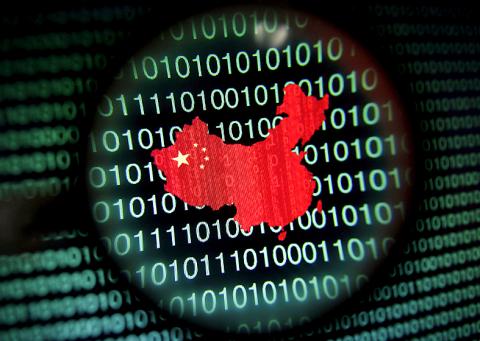Security researchers have many names for the hacking group that is one of the suspects for the cyberattack on the US government’s Office of Personnel Management: PinkPanther, KungFu Kittens, Group 72 and, most famously, Deep Panda.
However, to Jared Myers and colleagues at cybersecurity company RSA, it is called Shell Crew and Myers’ team is one of the few who has watched it mid-assault — and eventually repulsed it.
Myers’ account of a months-long battle with the group illustrates the challenges governments and companies face in defending against hackers that researchers believe are linked to the Chinese government — a charge Beijing denies.

Photo: Reuters
“The Shell Crew is an extremely efficient and talented group,” Myers said in an interview.
Shell Crew, or Deep Panda, is one of several hacking groups that Western cybersecurity companies have accused of hacking into US and other countries’ networks and stealing government, defense and industrial documents.
The attack on the OPM computers, revealed this month, compromised the data of 4 million current and former federal employees, raising US suspicions that Chinese hackers were building huge databases that could be used to recruit spies.
China has denied any connection with such attacks and little is known about the identities of those involved in them. However, cybersecurity experts are starting to learn more about their methods.
Researchers have connected the OPM breach to an earlier attack on US healthcare insurer Anthem Inc, which has been blamed on Deep Panda.
Myers says his team has no evidence that Shell Crew were behind the OPM attack, but believes Shell Crew and Deep Panda are the same group. And they are no newcomers to cyberespionage.
CrowdStrike, the cybersecurity company which gave Deep Panda its name due to its perceived Chinese links, traces its activities to 2011, when it launched attacks on defense, energy and chemical industries in the US and Japan, but few have caught them in the act.

DAREDEVIL: Honnold said it had always been a dream of his to climb Taipei 101, while a Netflix producer said the skyscraper was ‘a real icon of this country’ US climber Alex Honnold yesterday took on Taiwan’s tallest building, becoming the first person to scale Taipei 101 without a rope, harness or safety net. Hundreds of spectators gathered at the base of the 101-story skyscraper to watch Honnold, 40, embark on his daredevil feat, which was also broadcast live on Netflix. Dressed in a red T-shirt and yellow custom-made climbing shoes, Honnold swiftly moved up the southeast face of the glass and steel building. At one point, he stepped onto a platform midway up to wave down at fans and onlookers who were taking photos. People watching from inside

A Vietnamese migrant worker yesterday won NT$12 million (US$379,627) on a Lunar New Year scratch card in Kaohsiung as part of Taiwan Lottery Co’s (台灣彩券) “NT$12 Million Grand Fortune” (1200萬大吉利) game. The man was the first top-prize winner of the new game launched on Jan. 6 to mark the Lunar New Year. Three Vietnamese migrant workers visited a Taiwan Lottery shop on Xinyue Street in Kaohsiung’s Gangshan District (崗山), a store representative said. The player bought multiple tickets and, after winning nothing, held the final lottery ticket in one hand and rubbed the store’s statue of the Maitreya Buddha’s belly with the other,

‘NATO-PLUS’: ‘Our strategic partners in the Indo-Pacific are facing increasing aggression by the Chinese Communist Party,’ US Representative Rob Wittman said The US House of Representatives on Monday released its version of the Consolidated Appropriations Act, which includes US$1.15 billion to support security cooperation with Taiwan. The omnibus act, covering US$1.2 trillion of spending, allocates US$1 billion for the Taiwan Security Cooperation Initiative, as well as US$150 million for the replacement of defense articles and reimbursement of defense services provided to Taiwan. The fund allocations were based on the US National Defense Authorization Act for fiscal 2026 that was passed by the US Congress last month and authorized up to US$1 billion to the US Defense Security Cooperation Agency in support of the

‘COMMITTED TO DETERRENCE’: Washington would stand by its allies, but it can only help as much as countries help themselves, Raymond Greene said The US is committed to deterrence in the first island chain, but it should not bear the burden alone, as “freedom is not free,” American Institute in Taiwan Director Raymond Greene said in a speech at the Institute for National Defense and Security Research’s “Strengthening Resilience: Defense as the Engine of Development” seminar in Taipei yesterday. In the speech, titled “Investing Together and a Secure and Prosperous Future,” Greene highlighted the contributions of US President Donald Trump’s administration to Taiwan’s defense efforts, including the establishment of supply chains for drones and autonomous systems, offers of security assistance and the expansion of